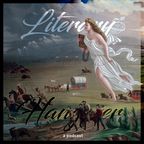
Literary Hangover
Summary: Literary Hangover is a podcast, released twice on Saturdays each month, in which Matt Lech and his friends chat about fiction and the historical, social, and political forces behind the creation of it and represented by it.
- Visit Website
- RSS
- Artist: Matthew Lech
- Copyright: 2019 Matthew Lech
Podcasts:
Hello everyone. Alex joins me this week to discuss Washington Irving's short story, Rip Van Winkle, a pioneering narrative inbeing annoyed with ones wife. This is the public version of Literary Hangover. To support the show, consider becoming a patron at patreon.com/literaryhangover, giving reviews in iTunes, Stitcher, etc and most happily telling your friends Follow us on twitter: @LitHangover @mattlech @Alecks_Guns References: "Peter Klaus," the folk tale Rip Van WInkle was based upon. https://www.worldoftales.com/European_folktales/German_folktale_6.html Biographer Brian Jay Jones on Irving at the New York Society Library https://www.youtube.com/watch?v=dZH6JJw6ngY&t=683s Michael Warner, "Irving's Posterity" in ELH (Fall 2000) "The American Experience: A Collection of Great American Stories" at Audible "Washington Irving and the Conservative Imagination," Allen Guttmann, American Literature (May, 1964)
Matt and Alex (@Alecks_Guns) talk about the first popular "American" novel in James Fenimore Cooper's "The Spy," and how Americans have learned to view the revolution. Special thanks to Grant Ertl of Aquanaut Media for the Literary Hangover podcast artwork. Twitter: @LitHangover References: The Spy, read by Flo Gibson (available through Audible) The Spy, read by the Librivox community. The James Fenimore Cooper Society at State University of New York College at Oneonta “The Counter-Revolution of 1776: Slave Resistance and the Origins of the United States of America” by Gerald Horne "Strange Nation: Literary Nationalism and Cultural Conflict in the Age of Poe ," by J Gerald Kennedy "Who Reads an American Book?" (1820) by Reverend Sydney Smith “American Revolutions: A Continental History,” 1750-1804 by Alan Taylor “Fenimore Cooper's America” by Alan Taylor, History Today. 46.2 (Feb. 1996) “The Unruly City: Paris, London and New York in the Age of Revolution,” by Mike Rapport “Cooper's The Spy and the Popular Spy Novel,” by Bruce A. Rosenberg, American Transcendental Quarterly (1993)